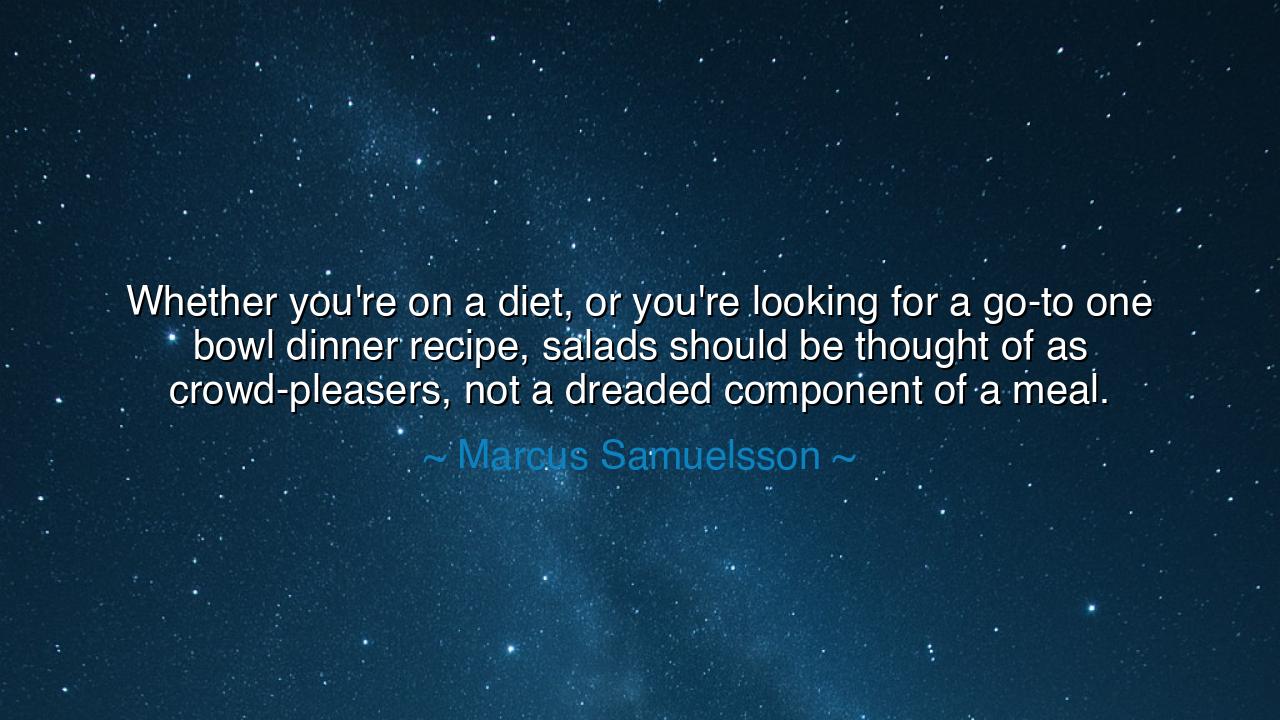
Whether you're on a diet, or you're looking for a go-to one bowl
Whether you're on a diet, or you're looking for a go-to one bowl dinner recipe, salads should be thought of as crowd-pleasers, not a dreaded component of a meal.






"Whether you're on a diet, or you're looking for a go-to one bowl dinner recipe, salads should be thought of as crowd-pleasers, not a dreaded component of a meal." – Marcus Samuelsson
In these words, Marcus Samuelsson offers more than a lesson in cooking—he offers a philosophy of celebration. He calls us to remember that food, in its truest form, is not a punishment or a test of will, but a source of joy, of gathering, of communion. Too often, the salad, that humble bowl of leaves and color, has been cast aside as the symbol of restriction—as the “dreaded component” of dieting and denial. But Samuelsson, a chef whose art is rooted in the global rhythm of culture and soul, reawakens in us the ancient truth: that even the simplest meal can be an act of beauty and togetherness.
The ancients understood this well. To them, the table was not merely a place of eating—it was an altar of life. In the homes of the Greeks, salads of herbs, olives, and grains were served not as meager offerings, but as a celebration of the harvest. They knew that each leaf, each olive, each sprig of mint carried within it the spirit of the earth—a reminder that nourishment comes not from indulgence, but from appreciation. To delight in simplicity was to honor both body and land. In his quote, Samuelsson revives this old wisdom, teaching us that to make food a joy, we must first learn to see abundance in the modest.
In a world consumed by excess, where feasts are measured in richness and size, the salad stands as a symbol of humility—a reminder that greatness need not be heavy or extravagant. Yet, many approach it with disdain, imagining it as punishment for appetite. Samuelsson’s wisdom challenges this narrow view. He speaks not as a scolder but as an artist, reminding us that a well-crafted salad—bursting with colors, textures, and flavors—is a crowd-pleaser, capable of delighting even the most skeptical of hearts. For he knows that when food is made with creativity and care, it transcends boundaries—it becomes art, culture, and memory combined.
Consider the story of the Roman general Lucullus, famed not only for his victories but for his love of refined dining. When he retired from war, he hosted feasts that became legend—not for their extravagance, but for their balance. His tables were adorned with bowls of greens, figs, and herbs dressed in oil and vinegar. When a servant once asked why he would prepare such delicacies when dining alone, Lucullus replied, “Tonight, Lucullus dines with Lucullus.” He understood what Samuelsson teaches: that the meal, no matter how simple, should never be dreaded. It should be enjoyed, for it is an offering to oneself and to life itself.
There is wisdom in this joy. When we approach our meals with gratitude and creativity, even a bowl of greens becomes a feast. The act of preparing food—of washing the leaves, mixing the dressing, arranging the bowl—is a meditation on care and presence. Samuelsson’s words remind us that eating well is not about restriction or luxury; it is about mindfulness—about seeing the sacred in the ordinary. When we shift our perception from punishment to pleasure, the salad ceases to be a symbol of denial and becomes a vessel of nourishment and connection.
The lesson is clear: how we perceive our food shapes how we live our lives. If we see our meals as dreary obligations, our days too will grow dull. But if we see them as moments of creativity and joy, life itself becomes richer. To make a salad a “crowd-pleaser” is not merely to mix vegetables—it is to craft an experience of color, texture, and vitality that honors both nature and self. Each ingredient tells a story: the sweetness of the tomato, the bitterness of the leaf, the sharpness of vinegar—all come together in harmony, much like the diverse hearts of a shared table.
So let this wisdom endure: food is not meant to be feared, but celebrated. Whether one is on a diet or simply seeking nourishment, let every meal be approached with wonder and respect. Take joy in the crafting of a simple dish; see beauty in the bowl before you. Invite others to share it, not as an act of discipline, but of communion. For when the heart rejoices in what it eats, the body too is healed.
Thus, remember Marcus Samuelsson’s words as both culinary and spiritual truth: the humble salad is not the enemy of pleasure, but its companion. To love your food, even in its simplest form, is to love your life. Transform what you once dreaded into what you delight in—and you will find that joy, like a well-made meal, multiplies when shared.






AAdministratorAdministrator
Welcome, honored guests. Please leave a comment, we will respond soon